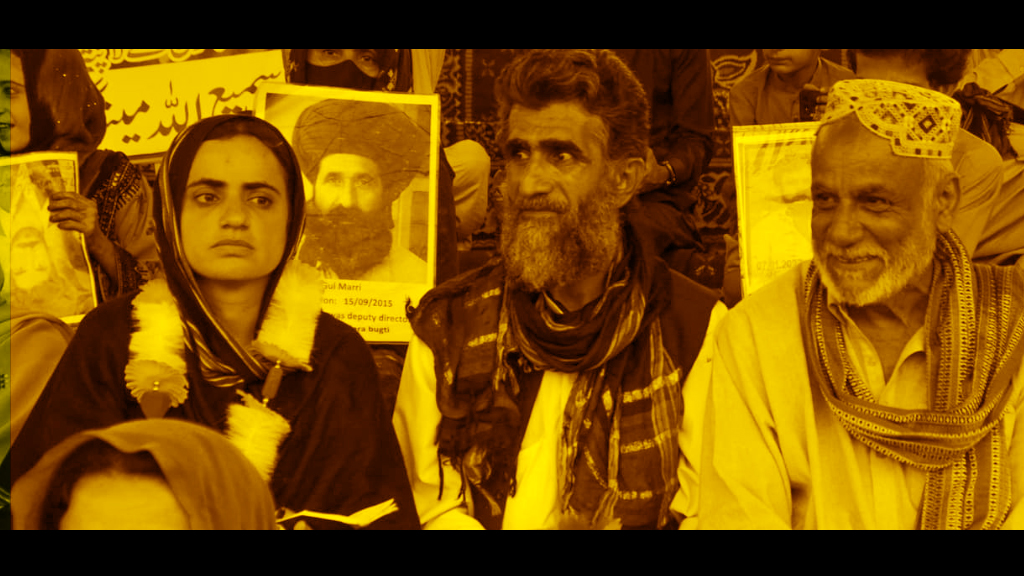HRCB condemns government’s targeting of activists and political leaders through misuse of Anti-Terror laws and political intimidation
The Human Rights Council of Balochistan (HRCB) condemns the alarming and systematic targeting of human rights defenders, political leaders, lawyers, and activists by the government. The deliberate misuse of the Fourth Schedule against Dr Mahrang, Sibghatullah and others, baseless legal charges against political figures such as Sardar Akhtar Mengal and his party leaders, and the arrest and harassment of human rights lawyer Imaan Mazari and her husband Abdul Hadi, reveal a clear strategy to suppress voices advocating for justice and human rights. This pattern of repression threatens the principles of democracy, free expression, and justice for the people of Balochistan and Pakistan as a whole.
The government’s placement of Dr. Mahrang Baloch, Sibghatullah Shah Jee, and other human rights defenders on the Fourth Schedule—a counter-terrorism tool meant for individuals posing legitimate security threats—marks an egregious misuse of the law. These individuals are advocates working to highlight injustices faced by marginalized communities, particularly within Balochistan, where state-led repression and enforced disappearances have drawn international condemnation. The government’s action not only distorts the purpose of anti-terror laws but also seeks to intimidate and prevent human rights defenders from carrying out their vital work. The Fourth Schedule designation severely impacts these individuals, imposing restrictions on movement, freezing their bank accounts, and subjecting them to constant surveillance. By classifying peaceful human rights work as a security threat, the government effectively labels advocacy as a crime. This misuse of anti-terror laws represents a severe breach of democratic values and international human rights standards, which protect the rights of citizens to engage in peaceful advocacy and dissent.
Sardar Akhtar Mengal, leader of the Balochistan National Party (BNP) and an elected representative, has been a vocal critic of the government’s policies towards Balochistan, consistently speaking out against issues such as enforced disappearances, extrajudicial killings, and the exploitation of Balochistan’s natural resources. His recent targeting by the government intensified following his refusal to support the 26th Constitutional Amendment. Mengal and his party opposed this amendment due to concerns over its implications, and he publicly condemned the forced signatures of BNP senators to back the amendment without party consensus. In response to his refusal to support the government’s agenda, the state has initiated a campaign of intimidation and harassment against Mengal and other BNP leaders, filing baseless cases and attempting to undermine their legitimate political activities. This targeting underscores a disturbing disregard for democratic representation and the freedom of elected officials to make independent decisions. Such punitive measures are intended to coerce compliance and silence a prominent leader who advocates for the rights of his constituents. The HRCB condemns this interference in the democratic process, viewing it as part of a broader campaign to erode Balochistan’s political voice and undermine opposition leaders. These actions reflect an increasingly authoritarian approach to governance, where dissent and political independence are met with state repression.
The recent arrest of Imaan Mazari, a prominent human rights lawyer known for her advocacy against human rights abuses, and her husband, Abdul Hadi, underscore the government’s willingness to intimidate and silence those who challenge it. Imaan Mazari has been a fierce advocate for justice, representing individuals subjected to state repression and highlighting the misuse of power in cases of extrajudicial detention and harassment. Her arrest and the harassment faced by her husband reflect a deepening crackdown on legal professionals who uphold the rule of law and advocate for accountability. The arrest of Mazari and Hadi follows a pattern of harassment, including surveillance, threats, and defamation campaigns designed to dissuade them from their work.
These actions form part of a growing trend in which the government uses legal mechanisms and baseless accusations to silence any form of dissent. By placing activists on the Fourth Schedule, fabricating cases against political leaders, and arresting outspoken critics, the government is creating a climate of fear that deters others from raising their voices against injustice. This crackdown, particularly focused on advocates for the Baloch people, speaks to a broader disregard for democratic principles and the protection of fundamental rights. The current wave of repression signals a disturbing message: that any dissent, especially from the marginalized and those speaking for the disenfranchised, will be met with persecution. This is a clear violation of Pakistan’s obligations under international human rights conventions, including the International Covenant on Civil and Political Rights, to which Pakistan is a signatory. These conventions guarantee citizens’ rights to freely express themselves, assemble peacefully, and participate in political life without fear of retaliation.
The HRCB urgently calls on the government to immediately remove the names of Dr. Mahrang Baloch, Sibghatullah Shah Jee, and other activists from the Fourth Schedule and cease the inappropriate use of counter-terrorism laws to monitor peaceful advocates. We further call for an end to the political persecution of Sardar Akhtar Mengal and members of the Balochistan National Party (BNP), and for the withdrawal of all baseless charges that undermine democratic political representation. We call on the government to release Imaan Mazari and Abdul Hadi and to halt the harassment of legal professionals and human rights advocates who hold the state accountable. The government must commit to international human rights standards by safeguarding the freedom of speech, peaceful assembly, and the lawful work of all human rights defenders.

